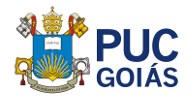Use este identificador para citar ou linkar para este item:
https://repositorio.pucgoias.edu.br/jspui/handle/123456789/3439| Tipo: | Trabalho de Conclusão de Curso |
| Título: | Sintomas vocais e alterações laríngeas na bulimia: uma revisão de literatura |
| Autor(es): | Borges, Itally Oliveira |
| Primeiro Orientador: | Ribas, Tânia Maestrelli |
| metadata.dc.contributor.referee1: | Dantas, Lucy Jane |
| metadata.dc.contributor.referee2: | Fernandes, Sandra de Freitas Paniago |
| Resumo: | Introdução: A voz é uma função importantíssima na vida do ser humano, exerce um papel fundamental na comunicação. É a identificação do indivíduo, revela emoções e sentimentos, sendo assim, qualquer modificação da voz é capaz de afetar a comunicação. Sabe-se que a bulimia nervosa é um transtorno alimentar em que o indivíduo realiza alta ingestão alimentar, seguido de comportamento compensatório para evitar o ganho de peso, caracterizado principalmente pela autoindução do vômito, fazendo com que ácido gástrico acompanhado pelo alimento retorne pela laringe causando lesões e danos a qualidade vocal. Objetivo: Investigar os sintomas e alterações vocais apresentadas por sujeitos com bulimia. Método: Foi realizado uma revisão narrativa em literatura nacional e internacional nas seguintes bases de dados: LILACS, SciELO, PubMed e BVS. Resultados e discussão: As alterações vocais se explicam em decorrência da exposição da laringe à ação ácida do conteúdo gástrico presente no vômito, causando assim sintomas e alterações similares aos encontrados no refluxo gastroesofágico. A rouquidão foi o sintoma vocal que predominou em 60% dos estudos, enquanto que a respeito das alterações laríngeas não houve concordância em relação aos achados entre as pesquisas. Conclusão: Os sintomas vocais mais mencionados foram a rouquidão, pigarro e dor de garganta. Dentre as alterações laríngeas de maior ocorrência foram encontrados edema de prega vocal e presença de acúmulo de secreção espessa na laringe. |
| Abstract: | Introduction: The voice is a very important function in human life, it plays a fundamental role in communication. It is the identification of the person, reveals emotions and feelings, so any voice modification is capable of affecting communication. It is known that bulimia nervosa is an eating disorder in which the individual undergoes high food intake, followed by compensatory behavior to avoid weight gain, mainly characterized by self-induced vomiting, causing the return of the gastric acid, accompanied by food, through the larynx, resulting in injuries and damage to vocal quality. Objective: To investigate the symptoms and vocal alterations presented by subjects with bulimia. Method: A narrative review of national and international literature was carried out in the following databases: LILACS, SciELO, PubMed and BVS. Results and discussion: The vocal alterations are explained by the exposure of the larynx to the acidic action of the gastric contents present in the vomit, thus causing symptoms and alterations similar to those found in gastroesophageal reflux. Hoarseness was the vocal symptom that predominated in 60% of the studies, while about laryngeal alterations there was no agreement regarding the findings among the studies. Conclusion: The most mentioned vocal symptoms were hoarseness, throat clearing and sore throat. Among the most frequent laryngeal alterations were vocal fold edema and presence of thick secretion accumulation in the larynx. |
| Palavras-chave: | Voz Bulimia |
| CNPq: | CNPQ::CIENCIAS DA SAUDE::FONOAUDIOLOGIA |
| Idioma: | por |
| País: | Brasil |
| Editor: | Pontifícia Universidade Católica de Goiás |
| Sigla da Instituição: | PUC Goiás |
| metadata.dc.publisher.department: | Escola de Ciências Sociais e da Saúde |
| Tipo de Acesso: | Acesso Aberto |
| URI: | https://repositorio.pucgoias.edu.br/jspui/handle/123456789/3439 |
| Data do documento: | 16-Dez-2021 |
| Aparece nas coleções: | TCC Fonoaudiologia |
Arquivos associados a este item:
| Arquivo | Tamanho | Formato | |
|---|---|---|---|
| TCC ITALLY-corrigido.docx | 62,91 kB | Microsoft Word XML | Visualizar/Abrir |
Os itens no repositório estão protegidos por copyright, com todos os direitos reservados, salvo quando é indicado o contrário.
Ferramentas do administrador
